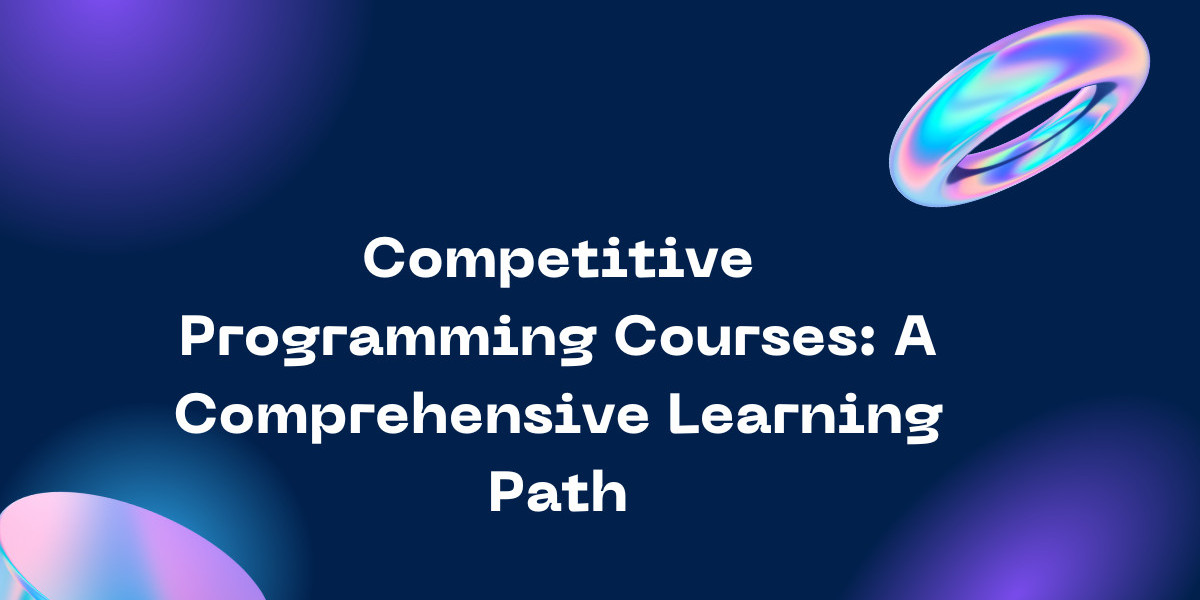Welcome to the world of Competitive Programming Courses: A Comprehensive Learning Path! In an era where technological innovation is at its peak, mastering the art of competitive programming has become an invaluable skill. This comprehensive course has been meticulously designed to guide you through a structured learning journey, providing you with the essential tools to excel in coding competitions. Whether you are a novice programmer eager to explore the realm of competitive coding or an experienced enthusiast seeking to sharpen your skills, this learning path offers a strategic and holistic approach to elevate your proficiency. Get ready to unravel the intricacies of algorithmic problem-solving, optimize your coding techniques, and embark on a transformative learning experience that will empower you to tackle coding challenges with confidence.
Competitive Programming Courses can provide numerous benefits to programmers, regardless of their skill levels. Here are some ways in which these courses can be instrumental in enhancing the capabilities of programmers:
Algorithmic Thinking:
Competitive programming courses emphasize algorithmic thinking, helping programmers develop efficient and optimized solutions for a variety of problems.
Problem-Solving Skills:
Participants learn how to approach and solve complex problems systematically, improving their problem-solving skills in real-world scenarios.
Efficient Coding Practices:
The courses focus on writing efficient and clean code, teaching programmers how to optimize their solutions for better performance.
Time Management:
In competitive programming, time is of the essence. These courses train programmers to manage their time effectively, a crucial skill in coding competitions and professional settings.
Data Structures Mastery:
Participants gain a deep understanding of various data structures, learning when and how to use them to optimize their code.
Preparation for Coding Interviews:
Many technical interviews for software engineering positions involve problem-solving and algorithmic questions. Competitive programming courses prepare programmers for such interviews by honing their skills in solving similar problems. You should also study the best spring boot course
Enhanced Logical Reasoning:
Competitive programming challenges often require logical reasoning and critical thinking. Engaging in these courses helps programmers improve their logical reasoning abilities.
Global Recognition:
Success in competitive programming contests can bring global recognition. Many technology companies recognize and value candidates with a strong competitive programming background during the hiring process.
Community Engagement:
Participating in competitive programming introduces programmers to a vibrant and collaborative community. This community engagement can lead to knowledge sharing, networking, and collaboration on coding projects.
Coding Confidence:
The challenges posed in competitive programming courses, which often mirror real-world problems, contribute to building confidence in tackling a wide range of coding challenges.
Versatility in Programming Languages:
Competitive programming courses often allow participants to use various programming languages, promoting versatility and adaptability in coding.
Continuous Learning:
The dynamic nature of competitive programming keeps programmers engaged and encourages a mindset of continuous learning. Participants are exposed to new challenges regularly, fostering a sense of curiosity and exploration.
Career Opportunities:
Beyond competitive programming contests, the skills acquired in these courses are highly sought after by technology companies. Strong problem-solving and coding skills can open doors to exciting career opportunities.
Competitive Programming Courses offer a structured and intensive learning experience that goes beyond traditional programming courses. They provide practical skills, foster a competitive mindset, and prepare programmers for real-world challenges, ultimately contributing to their professional growth and success in the field of computer science and technology.
Competitive Programming Courses typically cover a wide range of topics to equip participants with the necessary skills and strategies for excelling in coding competitions. While the specific content may vary between courses, here are common topics that are often included:
Introduction to Competitive Programming:
Overview of competitive programming, its significance, and the types of coding competitions.
Algorithmic Thinking:
Strategies for developing efficient algorithms to solve various types of problems.
Common algorithmic paradigms such as greedy algorithms, dynamic programming, and divide and conquer.
Data Structures:
In-depth coverage of essential data structures like arrays, linked lists, stacks, queues, trees, heaps, graphs, and hash tables.
Advanced data structures such as segment trees, Fenwick trees, and tries.
Dynamic Programming:
Techniques for solving optimization problems using dynamic programming.
Understanding overlapping subproblems and optimal substructure.
Graph Algorithms:
Graph traversal algorithms (DFS and BFS).
Shortest path algorithms (Dijkstra's algorithm, Bellman-Ford algorithm).
Minimum spanning tree algorithms (Prim's and Kruskal's algorithms).
String Algorithms:
Pattern matching algorithms (KMP algorithm, Rabin-Karp algorithm).
Longest common subsequence and substring problems.
Mathematics in Competitive Programming:
Number theory concepts, modular arithmetic, and combinatorics.
Techniques for solving mathematical problems efficiently.
Greedy Algorithms:
Understanding and applying greedy strategies to solve optimization problems.
Bit Manipulation:
Efficient manipulation of bits to solve problems.
Applications in solving coding challenges.
Geometry and Computational Geometry:
Basic geometric concepts.
Solving geometric problems in a computational setting.
Advanced Topics:
Advanced algorithmic techniques and paradigms.
Challenges involving advanced data structures and algorithms.
Dynamic Problem Variation:
Applying dynamic programming to various types of problems, including grid-based and sequence-based problems.
Advanced-Data Structures:
Treaps, persistent data structures, and other advanced data structures.
Practice Contests:
Regular participation in simulated contests to apply learned concepts and improve problem-solving skills. You should also study the best spring boot course.
Analysis of contest problems and solutions.
Coding Strategies:
Techniques for writing clean, modular, and efficient code.
Strategies for debugging and optimizing code.
Community Involvement:
Encouraging participation in online coding communities, forums, and discussions.
Networking with other competitive programmers.
As we conclude the Competitive Programming Courses: A Comprehensive Learning Path, we trust that this journey has equipped you with a robust foundation for excelling in the dynamic world of competitive programming. The skills you've acquired, the challenges you've overcome, and the strategies you've mastered are invaluable assets that extend beyond the confines of coding competitions. Remember, the learning path doesn't end here; it merely marks the beginning of a continuous exploration and refinement of your coding prowess. Stay engaged with the coding community, embrace new challenges, and continue to push the boundaries of your capabilities. Whether you aspire to participate in global coding contests, contribute to open-source projects, or pursue a thriving career in technology, the knowledge gained in this comprehensive course will serve as a guiding light. We congratulate you on your dedication and commitment to mastering competitive programming. May your coding journey be filled with continuous growth, innovation, and the thrill of solving intricate problems with elegance and efficiency.









